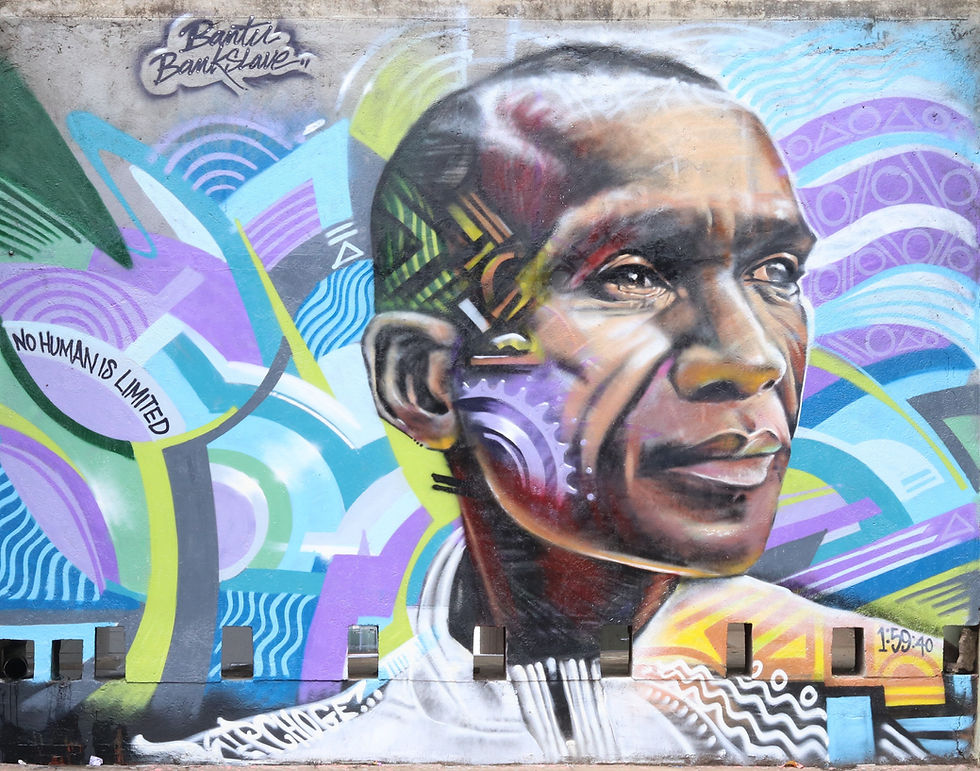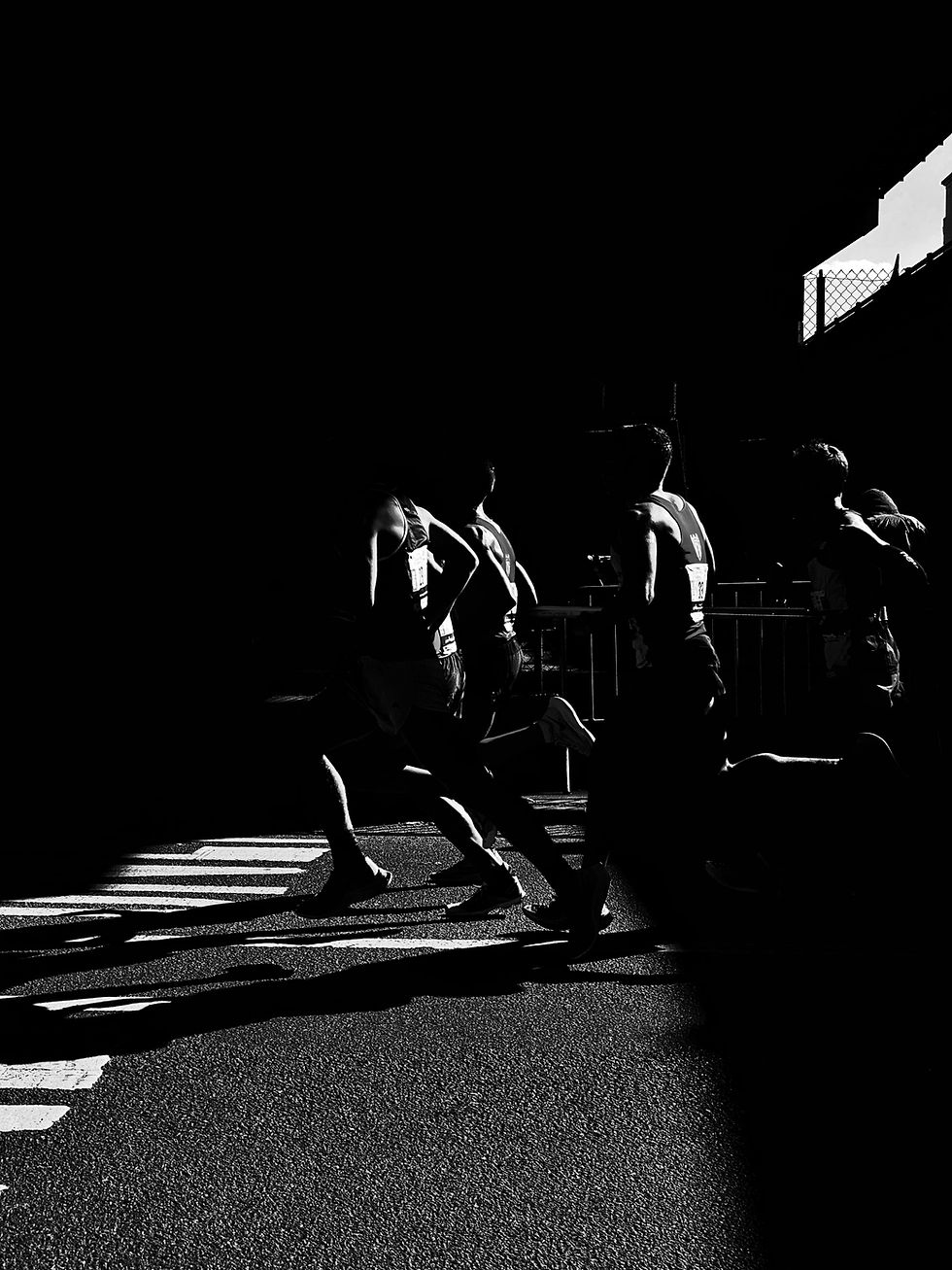02. "Music & Running: The Connections"
- edwardenman

- Mar 12, 2020
- 7 min read
Updated: Apr 8, 2020
Musician as Athlete
Performing musicians are athletes. The strength, stamina, coordination, and mental agility required to play an instrument at a high-level day-in and day-out for years mirrors the same qualities required by high-performance athletes. How each of those qualities is applied to the task at hand, and to what degree, obviously varies based on the activity, but the need for long-term consistent training is present in both music performance and athletic pursuits.
In some of my most formative years as a young musician, I had a teacher who instilled in me the concept that a performing musician needs to train like an Olympic athlete. "Do you think they just casually train for an hour a day?", was one question I remember him asking in relation to my daily practicing. Although his particular interests were with swimming and figure skating, I took that idea and related it to my interests of track & field, marathon running, and team sports like hockey and baseball. From the time this connection was presented to me, I have observed closely how high-level performers in all disciplines train and how they become so darn good at their chosen life-focus.
In this fascinating and candid interview with astounding pianist Daniil Trifonov, he describes his first activity of the day as going to the piano to address whichever musical fragment happens to be circling in his head, in this case Schoenberg's Op. 11 piano pieces. He does this primarily out of compulsion, and it shows the deep, fundamentally central role which music and the piano plays in his life. It surrounds and permeates his lifestyle to the degree that his self and the piano are inseparable. To be sure, we are not Daniil Trifonov, but we can take a lesson from observing him as an example of how to connect the most beneficially with musical training and performance.
In order to have a strong and sustainable relationship with musical training at a high level, it's not enough to impose desired standards of practice times or pieces learned. That can be a recipe for burnout and joy-stomping if regimented over a long time-frame. The life-long pursuit of musical performance, or many other crafts, needs to be established in daily lifestyle to the degree that it seems more natural performing the craft than not. This is speaking purely about life-commitment professional music making. It is, of course, possible to pursue music to a lesser extent, or to a more relaxed degree, and still be able to improve and be rewarded through the process of music making. The duel in a professional artist between the demands and the joy in their art is a topic for another day.
It's a Lifestyle
Although the creative dimensions in music-making are worlds largely unrelated to athletics, with a few exceptions such as figure skating and artistic gymnastics, the daily training built into daily lifestyle is common ground. Eliud Kipchoge is arguably the best marathoner of all-time. His training regiment at his training camp is absurd, but to get to this point he has put in over a decade of continuous, solid, elite marathon-training.
"...he’s nurtured his nature sublimely with likely 15 years of quality training. He’s found a striking balance between stressing his body and recovering."
-Running Science on Eliud Kipchoge
Kipchoge was born a natural runner in physique and in mind, but he also built each day of training upon the previous one for many, many years. This has allowed him to push himself beyond his known limits to seemingly set a new world record every few months as well as shatter the 2-hour marathon barrier in a controlled environment. Running and training has always been integral to his lifestyle. The supporting of this extended training required intense dedication affecting all aspects of life: food, sleep, and social life all ended up supporting the main goal.
Again, like we are not Trifonov, we are also not Kipchoge - nor are we Martha Argerich, Evgeny Kissin, Maurizio Pollini, or beasts of the athletic world like Brigid Kosgei, Kenenisa Bekele, or Shalane Flanagan. That's not the point, because we are ourselves, with our own strengths and ways of being. We can, however, draw valuable lessons and life tips from those who are the best in the world at what they do. We can take from the above and many other inspiring humans the lesson that if we can build our desire and our passion into the fabric of our daily lives so that it becomes natural and integral, burnout will be impossible, and our training should support and sustain us while giving us life and energy. It will not always be easy, of course - extended training in anything always has its difficulties - but the goal is to make the activity sustainable and to have the love and desire outweigh any challenges.
Musician and Athlete
There are potentially countless examples of quality musicians who are athletes to varying degrees, as well as athletes who are musically inclined. Running is an especially accessible activity, so there is a large presence of cross-over musician-runners. There are even many lists you can find of popular musicians who have completed marathons. It is also widely known that running was a large part of Beyoncé's formative training and she still keeps a robust training schedule to stay fit for her queenly tours of the world.
“I remember wanting to stop but I would push myself to keep going. It taught me discipline.”
-Beyoncé
In the world of classical music, such connections between athleticism and professional musician are kept more discrete, but are still present, especially as those professional musicians prepare for long stretches of performing and touring. I have plans to interview a few such musicians in the coming months, but in the meantime I have gathered three brief fascinating and differing profiles of classical musicians as athletes and runners.
Micheline Ostermeyer
A concert pianist and Olympic medallist, Ostermeyer won three medals at the Olympic games in 1948, just after winning the top piano prize at the Conservatoire National de Paris as well as extensive touring. She was not a runner, mind you, and won her Olympic medals in shot put, discus, and high jump, but her life and her balanced pursuit of excellence in music and athletics is fascinating. There is even video footage of her both competing in track and field as well as performing at the piano. To be sure, the level of specialization and technical prowess in the world of athletics has come a long way since the 1940s and athletes are running faster, throwing farther, and jumping higher from day to day, but still, in her time, Ostermeyer was among the top in her athletic disciplines while also maintaining a vigorous touring schedule.
Carter Brey
As the principal cellist of the New York Philharmonic since 1996, Carter Brey has been around the infamous New York City Marathon many times as a runner and an observer. In this thorough 15-year-old interview the cross-sections between cellist and runner are addressed from several angles, revealing a connection to which I closely relate.
"I think they both demand the same kind of discipline."
-Carter Brey
Both running and classical music are somewhat timeless, so most of the concepts about which Brey speaks are still completely relevant when discussing running as a professional musician (except perhaps running with a "portable CD player"). Since the time of that interview, Brey has run the NYC Marathon three more times, most recently in 2017.
"In a way you could say that being a musician makes you a better runner just simply in the sense you're used to a kind of discipline that requires a solitary application several hours a day."
-Carter Brey
Selene Sharpe
To add a Canadian into the mix, enter Selene Sharpe who won the 2019 Winnipeg Marathon at the age of 19 while also being a soprano and a music student at the University of Manitoba. Training for a marathon as a university student in any discipline is an intense undertaking. I ran my first marathon one week before I began grad school, but my goal was simply to make it through to the finish, not to be anywhere near the front of the pack (and certainly not finishing with sub-3-hour time). It takes an immense amount of self-training and discipline to flourish in both fast distance running and full-time studies.
“I just love the sense of freedom I feel when I run...If I have a lot on my mind, I find that running helps me to release any negative emotions I’m internalizing. Even if it is just for 30 minutes, I can forget about the things that are causing me stress, and I can just focus on running.”
-Selene Sharpe
This above quote from Sharpe opens up a topic which I will explore in my next post - the interplay of running and musical training and how they complement each other. Sharpe's profile is especially interesting because she is entering the years of physical prime for an athlete, while also getting through those formative years of schooling which are so crucial for a professional musician. Also, the fact that she was able to run sub-3-hours independently without a coach makes me wonder just how well she could run under the guidance of an instructor. Watching her story from afar will be a curious exercise to see how the balance develops between her athletics and her musicality.
Take-Aways
These cases are exceptions, and for most of us who make music and run in the same day, the purpose of one or the other, or both, is enjoyment and a change of pace from the rest of our professional and personal lives. We run and we make music sometimes because we can do nothing else, and other times simply because it makes us feel like more competent, confident, and complete individuals. By following and reading about the best in the world at various activities, I always try to take from them what I can implement in my own life and help me with my own understood balance of an active lifestyle and professional music career. Hopefully you can do the same and find inspiration in those who seek only the best in their life's craft.
If you have any comments or ideas for future topics, please write below - I'm always up for suggestions! You can also subscribe to The Running Pianist Newsletter with your email here, and check me out on Instagram here.
Coming Up Next: 03. "Complementary Forces"






Comments